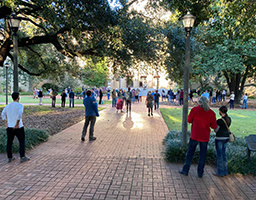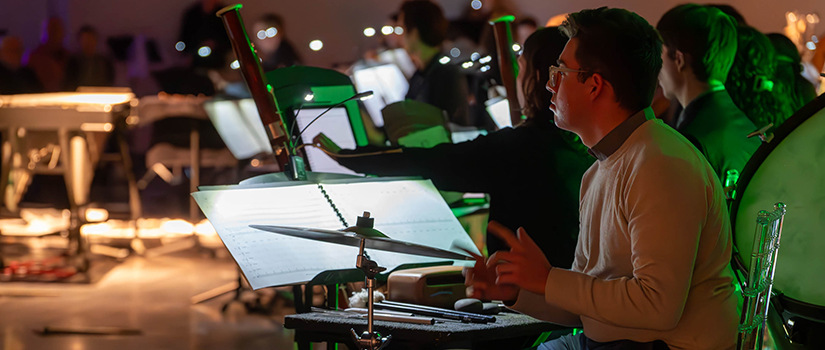That’s how Mike Harley, a professor of bassoon at the University of South Carolina’s School of Music, describes his advocacy and affinity for contemporary music.
“Music responds to our times, and in that way, we relate to it differently than we do to music of the past,” he says. “It’s exciting to work with living composers, to hear from them what they are trying to communicate in their music, and then be a part of bringing a new piece into the world.”
Harley has been director of the Southern Exposure New Music Series, which focuses on contemporary music, for more than 12 years.
For the 2024-2025 season, Southern Exposure has helped commission new pieces by alumni composers and invited student, faculty and alumni ensembles, instrumentalists and singers to perform in the four centennial concerts. The series is among the concerts and special performances to commemorate the School of Music’s 100th anniversary. Designed to showcase the school’s many opportunities for music making and education, the theme for the yearlong celebration, “Sing Thy High Praise: 100 Years of Music at Carolina,” is pulled from the first line of USC’s alma mater.
Southern Exposure: A culture of contemporary music
The Southern Exposure New Music Series was founded by composition professor John Fitz Rogers in 2001 to expand the School of Music’s culture of contemporary music.
“I thought about the term ‘Southern exposure’ in terms of opening up the aperture and exposing people to different kinds of contemporary classical music,” Rogers says. “It's always been about featuring interesting music played by talented groups, which may be national, international or homegrown here at the School of Music.”
Since becoming director in 2012 (after previously serving with Rogers as assistant director), Harley says his goal has been to build on that tradition.
“Every season is a unique new challenge of curating the concerts to represent some of the more exciting young artists and dynamic composers in contemporary music,” Harley says. “This centennial season features some of our most acclaimed alumni, as well as our current students and faculty.”Among those alumni is Baljinder Sekhon (’02 bachelor’s, music composition/percussion). Sekhon’s new composition, Divination, will be premiered by the BlackBox Ensemble in an Oct. 4 concert. The composition focuses on the future as a way of celebrating past accomplishments upon which the future is built.
“In considering the many ways to celebrate such a milestone, I gravitated towards focusing on a future built by the previous century – imagining the beginning of a new centennial and dreaming of what the future might hold,” says Sekhon, who teaches composition and electronic music at Penn State University.
Sekhon’s music has been presented in over 600 concerts in 26 countries. From works for large ensemble to solo works to electronic music, his music demonstrates a wide range of genres and styles. Sekhon, who completed his master’s and doctoral degrees at the Eastman School of Music in Rochester, New York, says the USC School of Music provided the foundation for his career.
“My experience with Southern Exposure in particular might have had the single biggest impact on my musical thinking, compositional path, and understanding of the contemporary music field,” he says. “I was a student when John Fitz Rogers launched Southern Exposure, and being included on one of their concerts over 20 years later will be among the activities and premieres I’m most proud of.”
Horseshoe concert: 100 percussionists
 The second of the 2024-2025 season’s four concerts, “Exposed Wiring” (Nov. 15), co-curated
by composition and theory professor Reginald Bain and including several works by faculty composer-performers David Kirkland Garner and Greg Stuart, will feature technology such as video, electronics or special amplification as an
integral part of the production. The third, on Jan. 31, brings the North Carolina-based
ensemble earspace to campus for their Columbia debut. The season finale, John Luther Adams’s Inuksuit, on March 29 will include up to 100 percussionists, including the School of Music’s
award-winning USC Percussion Ensemble, alumni and other invited musicians.
The second of the 2024-2025 season’s four concerts, “Exposed Wiring” (Nov. 15), co-curated
by composition and theory professor Reginald Bain and including several works by faculty composer-performers David Kirkland Garner and Greg Stuart, will feature technology such as video, electronics or special amplification as an
integral part of the production. The third, on Jan. 31, brings the North Carolina-based
ensemble earspace to campus for their Columbia debut. The season finale, John Luther Adams’s Inuksuit, on March 29 will include up to 100 percussionists, including the School of Music’s
award-winning USC Percussion Ensemble, alumni and other invited musicians.
To highlight the centennial theme and the School of Music within the broader campus, Inuksuit will be staged on USC’s historic Horseshoe. Intended to be performed and experienced outdoors, Inuksuit was inspired by stone sentinels constructed over centuries by the Inuit people in the Arctic.
Preparation for the large performance requires teamwork and dedication, says production team member Alyssa Santivanez (’23 master’s music performance with a concentration in community engagement).
Community engagement and collaborative arts opportunities such as the Southern Exposure and Ears Wide Open concert series, to me, are what the university music student experience is all about.
– Alyssa Santivanez (’23, MM performance)
“Our team is full of passionate musicians and ambitious collaborators who strive to make our concerts an impactful experience both for the performers and the audiences,” she says. “There are so many behind-the-scenes moments and little details that go into constructing such a grand event.”
The Southern Exposure performance is only one special production the USC Percussion Ensemble will participate in during the centennial year. This summer the ensemble was one of three collegiate winners in the Percussive Arts Society International Percussion Ensemble Competition. The prestigious award is widely recognized as the pinnacle achievement for the percussion ensemble art form.
USC is among a handful of institutions that have achieved this honor three times – previously winning in 2012 and 2021. (Competition winners must wait three years to reapply.)
As one of the winners, the Percussion Ensemble will perform a 50-minute showcase in November at the Percussive Arts Society International Convention in Indianapolis, Indiana. The convention is one of the world’s largest drum and percussion events.
“Winning is such an honor to be recognized by your peers, and it’s exciting that we were eligible and won in the School of Music’s centennial year. It’s an exceptional experience to perform in a venue filled with about 2,500 people who truly understand what we’re doing as percussionists,” says percussion professor Scott Herring, who directs the ensemble.
Students, such as Adam Clifton who is pursuing his master’s degree in music performance, are excited about that opportunity.
“While many audiences appreciate music, the entire audience at PASIC are percussionists,” he says. “It is just such a special opportunity to perform in that environment and to be recognized for our excellence in performance, both musically and technically.”
At its core, USC’s program values the cultivation of proficient, versatile musicians who just so happen to play percussion. Our regular participation in large ensemble, chamber music, and contemporary performance settings enables consistent development of the diverse skill set necessary to succeed as percussionists. As students, we benefit greatly from this intensive exposure to multi-faceted musical contexts that inform and amplify our interests.
— Julia Ross (DMA candidate, percussion)
While preparing for their submission and the showcase performance requires hard work, Herring says students are willing to make the commitment to be recognized for their excellence as musicians. He adds that winning the competition multiple times adds value to their degree, as the school becomes a destination program, especially at the graduate level.
“Winning IPEC for a third time is a tremendous honor that speaks to both the collective work ethic of USC’s percussion studio and Dr. Herring’s and Dr. Bailey Seabury’s commitment to our continued growth as musicians and people,” says doctoral candidate Julia Ross. “The repertoire they’ve chosen for this performance is challenging yet rewarding to play and will exponentially augment our musicianship.”
Like the Southern Exposure New Music Series, the art of percussion thrives on contemporary music because compositions for percussion ensembles were rare or nonexistent before the 1920-30s, Herring says. Their selections for the convention performance include new pieces by alumnus JaRon Brown; percussionist Susan Powell; Garth Neustadter’s Seaborne, an ocean-inspired piece accompanied by a film; and a surprising new arrangement of a country classic by jazz studies professor Matthew White.
Composition: Creating new music
By its nature, the School of Music’s composition program fosters the creation of new and contemporary music.
“Our program seeks to show the depth and breadth of contemporary music, as well as feature the richness of our students’ talents,” says composition professor John Fitz Rogers. “Such diversity encourages our students to experiment and try new approaches in their own work.”
Composition students benefit from wealth of musical resources at USC, including outstanding performers and conductors, two advanced computer music studios and extensive holdings in the Music Library. In addition, opportunities such as the Whittaker Composition Commission and the Duncan Endowment for Student Composers foster creativity by supporting young composers.
The Whittaker fund awards an undergraduate or graduate composition student an opportunity to write a new work to be premiered by a School of Music ensemble. The Duncan Endowment supports the annual reading and recording of new works written by composition students by an ensemble on the Southern Exposure series.
Ian Schwalbe, a recipient of both awards, says the faculty composers and School of Music support system provide excellent education and inspiration for composition students. His work, Tree(3), was premiered in March 2024 by The Collective, a mixed-instrumental ensemble of graduate student performers, and Divisive Connection was recorded by Wet Ink, a group that performed at the 2023 Southern Exposure New Music Series.
Schwalbe, a 2024 composition graduate now pursuing a master’s degree at Florida State University, says the recognition helped him experiment in different compositional styles and gave him confidence in his writing.
“Having the opportunity to write this music, receive great recordings and get feedback from the musicians has certainly helped me grow as a composer and brought me access to more opportunities,” Schwalbe says.
USC is lucky to have several brilliant composers in addition to an amazing support system for the composition area.
— Ian Schwalbe (’24, BA composition)
Events such as Southern Exposure concerts enhance that experience by giving both students and faculty the chance not only to feature their music but also to be inspired by and learn from guest artists. Featuring alumni in the centennial season also shows students the many different careers they may pursue after USC.
This year, the Duncan reading and recording will be done by earspace, which will be performing Schnee by Danish composer Hans Abrahamsen at a concert on Jan. 31. Philip Snyder (’18 doctorate, flute performance), a member of earspace, says nothing can compare to working through ideas with performers in a workshop and then hearing the results in a professional recording.
“Students experience what it feels like to operate at high levels and set high bars for achievement,” says Snyder, who also holds a master’s degree from USC, is an instructor of flute at the University of Mississippi and an associate producer for classical music at Spoleto Festival USA. “It is those practical, hands-on experiences that solidify and push emerging musicians into wanting the next level for themselves.”
